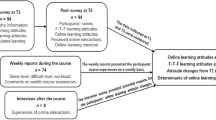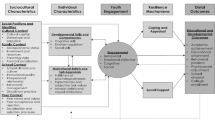Abstract
In contrast to other studies of students in online environments, which examine the skills and attitudes that students bring to an online university learning environment, we are interested in the expectations with which students come to online university study. Four expectational barriers, which arise from students’ background and cultural history, are identified as being: who is responsible for learning, who is responsible for student interaction with content, who is responsible for the use of appropriate learning strategies and who is responsible for required ancillary skills. There is a discussion of how these barriers arise and how one might attempt to manage the students’ expectations and ameliorate their effects.
Preview
Unable to display preview. Download preview PDF.
Similar content being viewed by others
References
APA. Learner centered psychological principles: a framework for school design and reform. American Psychological Association, Board of Educational Affairs (1997)
Bolliger, D.U., Martindale, T.: Key factors for determining student satisfaction in online course. International Journal on E-Learning, 61–67 (January-March 2004)
Burford, S., Haggis, J.: Multicultural awareness: issues for online education. In: Sims, O’Reilly, Sawkins (eds.) Learning to Choose – Choosing to Learn. Short Papers and Works in Progress presented at the 17th Annual Conference of the Australasian Society for Computers in Learning in Tertiary Education (ASCILITE), December 10-13 (2000)
Chou, C.C.: A model of learner-centered computer-mediated interaction for collaborative distance learning. International Journal on E-Learning, 11–18 (January-March 2004)
Coldwell, J., Newlands, D.: Deakin online: an evolving case study. Issues in Informing Science and Information Technology 1, 1–10 (2004)
Deakin University. Online technologies in courses and units - operational policy (2003), http://theguide.deakin.edu.au
Deakin University. Student charter (2004), http://theguide.deakin.edu.au
Harris, D.: Creating a complete learning environment. In: French, Hale, Johnson, Farr (eds.) Internet Based learning: an introduction and framework for higher education and business. Stylus Publishing, Sterling (1999)
Hillman, D., Willis, D., Gunawardena, C.: Learner-interface interaction in distance education. The American Journal of Distance Education 8(2), 31–42 (1994)
Richards, C.: Distance education, on-campus learning, and e-learning convergences. International Journal on E-Learning, 30–39 (July-September 2002)
Richardson, J.: Cultural specificity of approaches to studying in higher education: A literature survey. Higher Education 27, 449–468 (1994)
Salmon, G.: E-tivities: the key to active learning online. Kogan Page (2002)
Salmon, G.: E-moderating: the key to teaching and learning online. Routledge Falmer (2003)
Smith, P.J., Smith, S.N., Coldwell, J., Murphy, K.: Patterns of engagement in CMC: comparisons between Australian and Chinese students. In: Pioneers 2004 Conference, Toronto (2004)
Smith, S., Miller, R., Crassini, B.: Approaches to studying of Australian and overseas Chinese university students. Higher Education Research and Development 17(3), 261–275 (1998)
Author information
Authors and Affiliations
Editor information
Editors and Affiliations
Rights and permissions
Copyright information
© 2005 Springer-Verlag Berlin Heidelberg
About this paper
Cite this paper
Newlands, D.A., Coldwell, J.M. (2005). Managing Student Expectations Online. In: Lau, R.W.H., Li, Q., Cheung, R., Liu, W. (eds) Advances in Web-Based Learning – ICWL 2005. ICWL 2005. Lecture Notes in Computer Science, vol 3583. Springer, Berlin, Heidelberg. https://doi.org/10.1007/11528043_37
Download citation
DOI: https://doi.org/10.1007/11528043_37
Publisher Name: Springer, Berlin, Heidelberg
Print ISBN: 978-3-540-27895-5
Online ISBN: 978-3-540-31716-6
eBook Packages: Computer ScienceComputer Science (R0)




